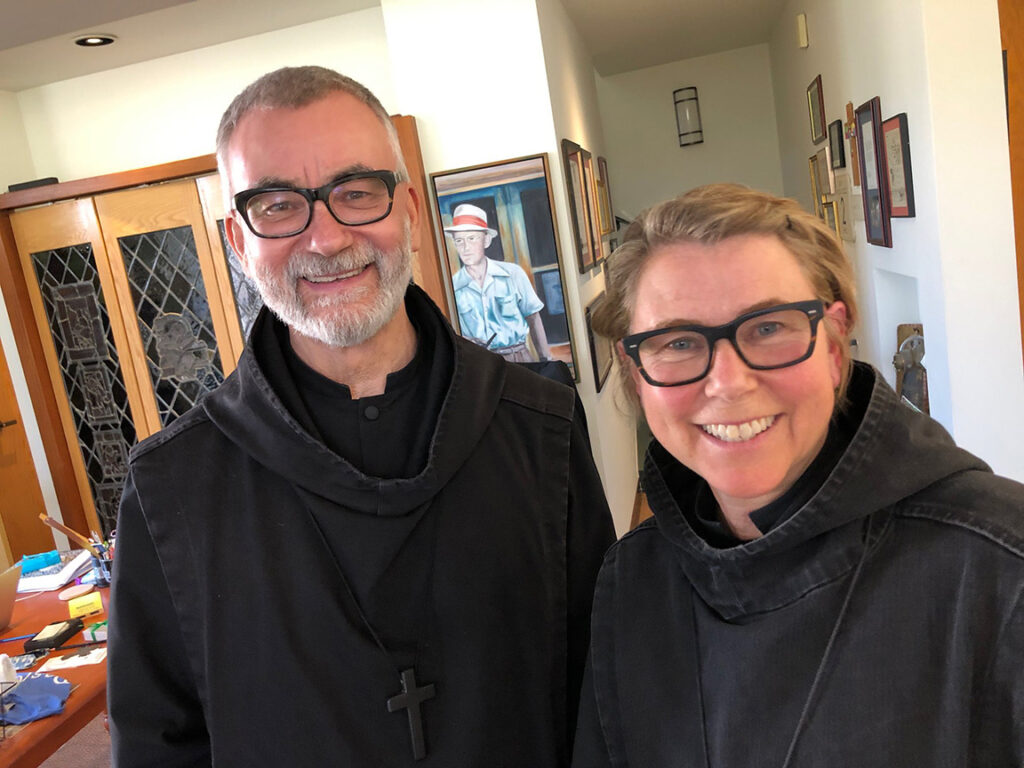
Dennis Gibbs and Greta Ronningen, founding members of the Community of Divine Love and chaplains to incarcerated persons through Prism, the diocese’s restorative justice ministry, visit Bishop John Harvey Taylor’s office at St. Paul’s Commons. Photo: John Taylor
[The Episcopal News] The Community of Divine Love is making a “bittersweet” move from San Gabriel to San Luis Obispo, in the Diocese of El Camino Real, but hopes to maintain a Southland presence, Sister Greta Ronningen announced during a Sept. 25 special online gathering.
“There were very exciting doors that kept opening wide for us,” such as evolving partnerships with restorative justice ministries as well as the prospect of creating a new CDL campus, with six or more 400-square-foot hermitage-style “tiny houses” for guests and community members, she said. A capital campaign to acquire land and create the new campus has raised about $635,000 toward a $1million goal.
“We will have a place for silent retreats, and for you to come and pray with us, as we evolve,” Ronningen told those attending the event. “It just seemed like God is saying ‘yes, yes, yes’ to the move.”
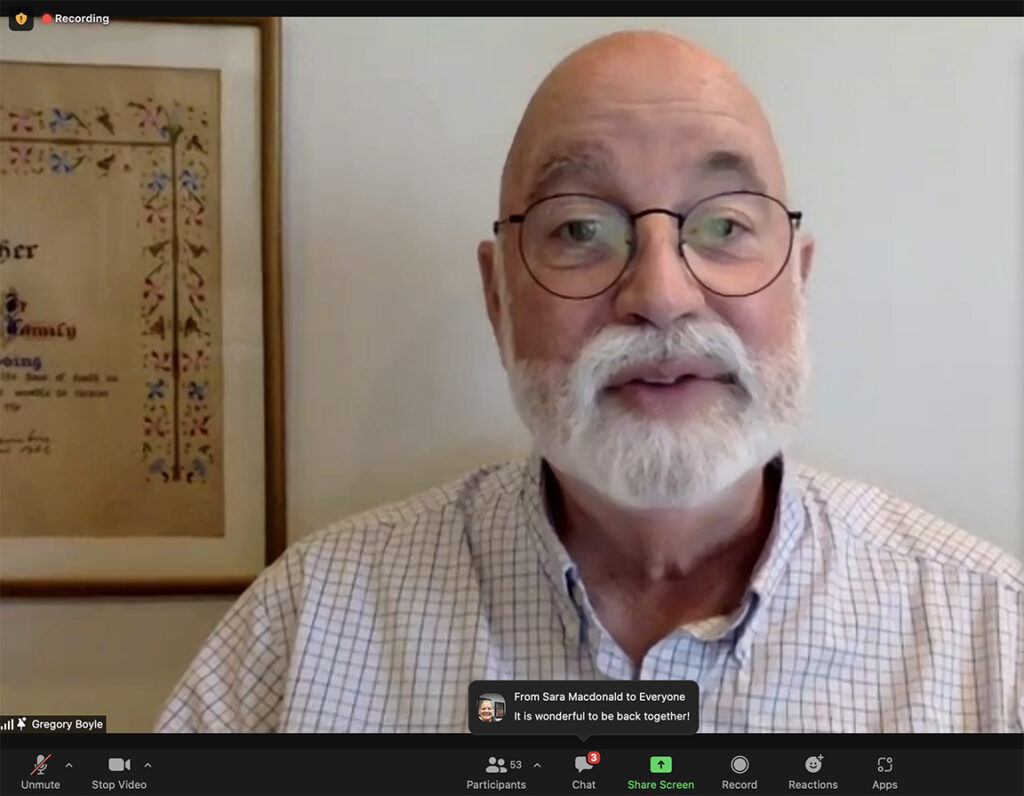
Greg Boyle, founder of Homeboy Industries and a longtime friend and colleague of CDL founders Dennis Gibbs and Greta Ronningen, gave a keynote speech at the CDL event on Sept. 25. Photo: Screenshot
The gathering, which featured Fr. Greg Boyle, founder of Homeboy Industries, as guest speaker, was attended by about 60 well-wishers from across the country. Testimonials from CDL’s community and incarcerated friends were also included in the program.
The Community of Divine Love grew out of Prism, the diocesan restorative justice ministry, after Brother Dennis Gibbs assumed its leadership in 2004. Ronningen began visiting the jails in 2008 and joined the diocesan staff two years later. CDL will remain at 617 W. Roses Road, San Gabriel, until the end of the year, she said. The monastery will rent space as it continues to raise funds and seek a site for the new campus.
Both Ronnigen and Gibbs said they hope Prism will continue in the Diocese of Los Angeles after the monaster’s relocation. When Gibbs, 67, retired July 1, Ronningen became co-director along with Sharon Crandall, a CDL oblate for more than nine years and a parishioner at Church of Our Saviour in San Gabriel.
New ministry; evolving partnerships
Ronnigen said CDL is looking forward to exploring evolving partnerships, including with the California Men’s Colony, which houses about 3,700 male inmates in two Central Coast facilities, the oldest of which dates to 1954. The facility has a wide variety of educational, vocational and psychological-treatment programs where Ronningen will lead healing sessions and continue restorative justice ministry, she said.
The new location will also place CDL closer to the Central California Women’s Facility in Chowchilla, which she visits monthly. With about 2,600 inmates at varying security levels, it is considered the largest female correctional facility in the United States.
CDL will also collaborate with Restorative Partners, a nonprofit agency that provides services and programs focused on mind, body and spiritual transformation and also accompanies and aids reincorporation of those recently released from the San Luis Obispo County Juvenile Hall, Honor Farm, and state prisons in the community.
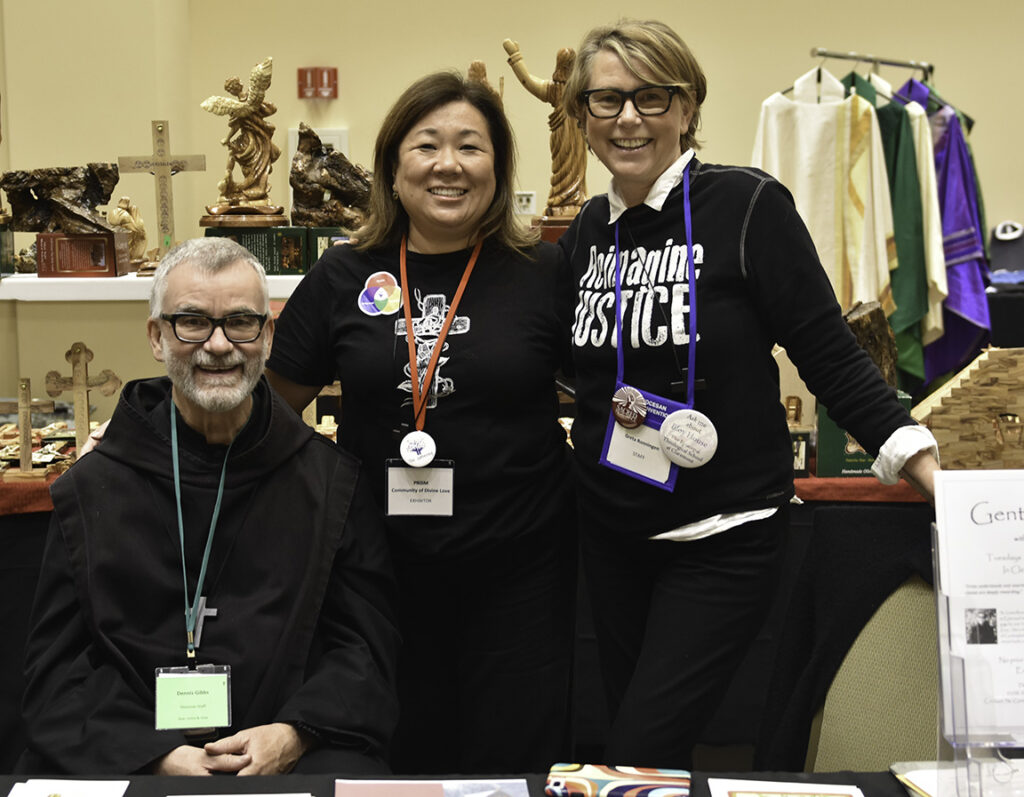
CDL monks Dennis Gibbs and Greta Ronningen (at right) pose with CDL oblate Sharon Crandall, lay chaplain, staff the Prism booth at the 2019 Diocesan Convention. Photo: Colleen Dodson Baker
The agency operates five post-incarceration houses, a mentoring program and recently bought a restaurant with the intention of providing employment for parolees, she added.
CDL encompasses 13 oblates or affiliates, plus 21 divine companions, Gibbs said. The divine companions are “living a rule of life in prison,” Gibbs said. “This moment in our life has really helped us to kind of lean into what does it mean truly to be a community of divine love.”
Gibbs will continue to publish “The Journey,” a monthly newsletter that goes to 23 prisons, and Ronnigen said CDL plans to continue such online programs as her monthly meditative Silent Saturdays, Tuesday night centering prayer led by Crandall and a Wednesday night Sacred Journey session led by Gibbs.
“We might be going but we’re not leaving,” Gibbs said. “The bonds of love and affection that we have begun here will continue for years and years to come.”
“We have great gratitude for this season we’ve been here,” added Ronnigen.
Boyle: ‘unlock eternity for each other’
Relocation and place are less about a physical location and more about a way of being – the kind of compassion, joyfulness and bravery that leads ministries like Prism to those at society’s margins, Boyle told the gathering.
A place might be imagined as “the circle of compassion and then imagine nobody standing outside that circle,” Boyle said. “The hope is that together, we will dismantle the barriers that exclude, so we will no longer settle for the description of the place but hold out for the place itself.
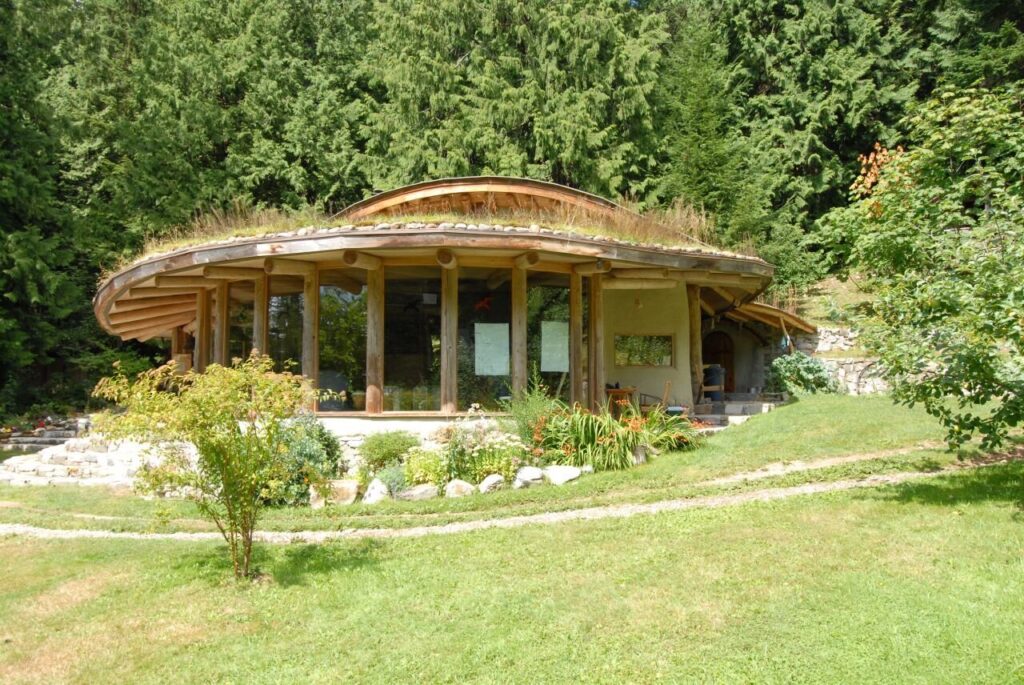
Although CDL has not yet purchased a property for its new monastery, plans for its new buildings are already in work. This artist’s rendering shows a design for a circular worship and meeting space.
“And so, we stand with the poor and the powerless and the voiceless and we stand with those whose dignity has been denied. We stand with those whose burdens are more than they can bear … so that the day will come when we stop throwing people away.”
God’s preferential care and love for the marginalized is an avenue “to get us to the kinship of God,” and not the other way around, said Boyle, who began Homeboy Industries in 1988. It is now the largest gang intervention, rehab and re-entry program in the world. “I had a homie who I call my spiritual director; Sergio,” Boyle said. “And he wrote me an email as we email every morning to each other. And he said, ‘let us unlock eternity for each other.’”
The ministry of Prism and the task of all people is “to remind one another that we all belong, we all live in the same house,” Boyle added. “And we return people to themselves. You don’t give them nobility; we just remind them of their noble hearts. And in this way, we embrace the things that Jesus took seriously … inclusion, nonviolence, unconditional loving kindness, and compassion and acceptance. We embrace those things with joy and bravery.”
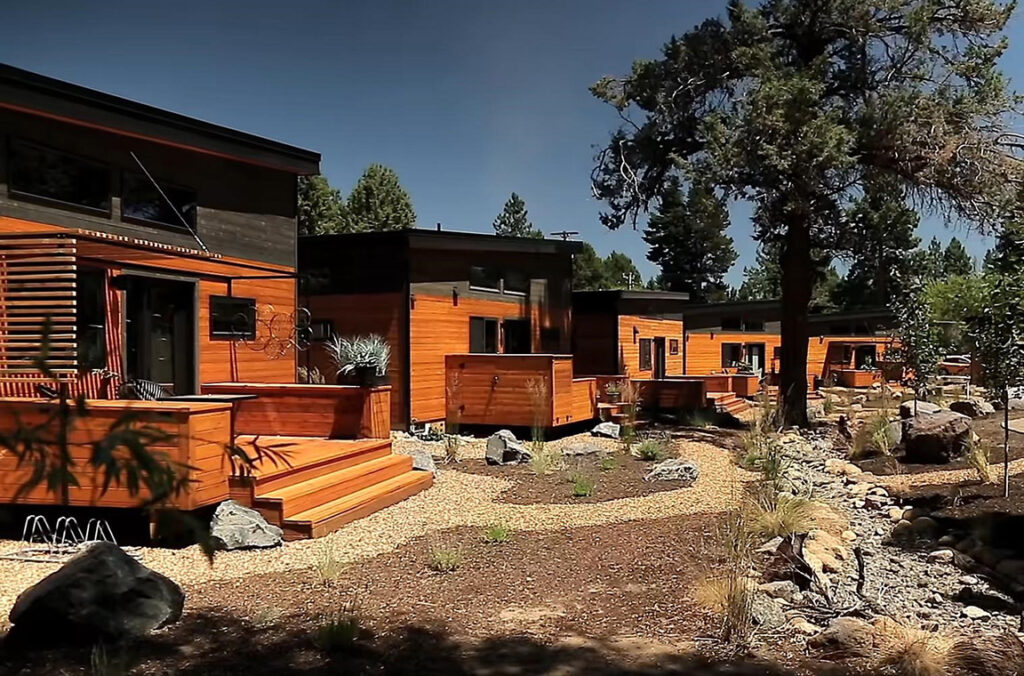
CDL’s plan for a new monastery in the San Luis Obispo area includes a group of “tiny houses,” as shown in this artist’s rendering, that will be occupied by people who come to the property for retreats.
Which means holding people with tenderness, helping them feel they are in a safe place. “And they gain newfound resilience,” Boyle said of those he ministers to. “And they leave us after 18 months. And now the world will throw at them what it will, but this time, they won’t be toppled by it. Because they find a sanctuary in each other, a shelter in each other. And then they become the sanctuary they saw and then they go home to their kids and present that sanctuary. And suddenly, you’ve broken a cycle.”
Engaged in the world
Several grateful community members told the gathering’s attendees that CDL had become such a place – of safety, hope and new life – for them.
Prism co-director Crandall considers the monastery “a sacred lifeline.”
It “has become my ground of being, the framework and structure for all things in my life,” she said. “It’s a place where I’m nourished to go out into the world and live, in prayerful action, with real commitment to my fellow humans with true and authentic love.”
Unlike monasteries that are removed from the daily life beyond their walls, “the Community of Divine Love is engaged in the world,” she added. “This feels like their divine superpower. It gives monasticism and contemplative life a 21st-century feel. This is a rare and precious gift in our lives today.”
CDL board member Patrick Crandall, who is married to Sharon Crandall, said, “An important way that we as individuals can try to mend these fractious times and erase the boundaries that exclude is to join these compassionate truth tellers and support and amplify their voices.”
Similarly, Joyce Swaving, who serves as bridge-builder at St. George’s, Laguna Hills, said visits with CDL became especially meaningful during the pandemic. “In the midst of all the uncertainty of the virus, the fear and the feelings of disconnection, it became a virtual refuge and a supportive, hope-filled community for me.
“The Community of Divine Love has softened my heart, has broken my heart and expanded it,” she said gratefully. “It’s a place where we can be candid, a place where we can share exactly what’s happening without having to edit. I especially want to thank Brother Dennis and Sister Greta, who helped ground me and helped me explore my discernment for lay ministry, and what God is calling me to be and what to do. It’s truly a safe haven of love, acceptance, nurturance and spiritual exploration that has embraced a wretch like me, who has often felt invisible, yet longs for the spirit of love and help.”
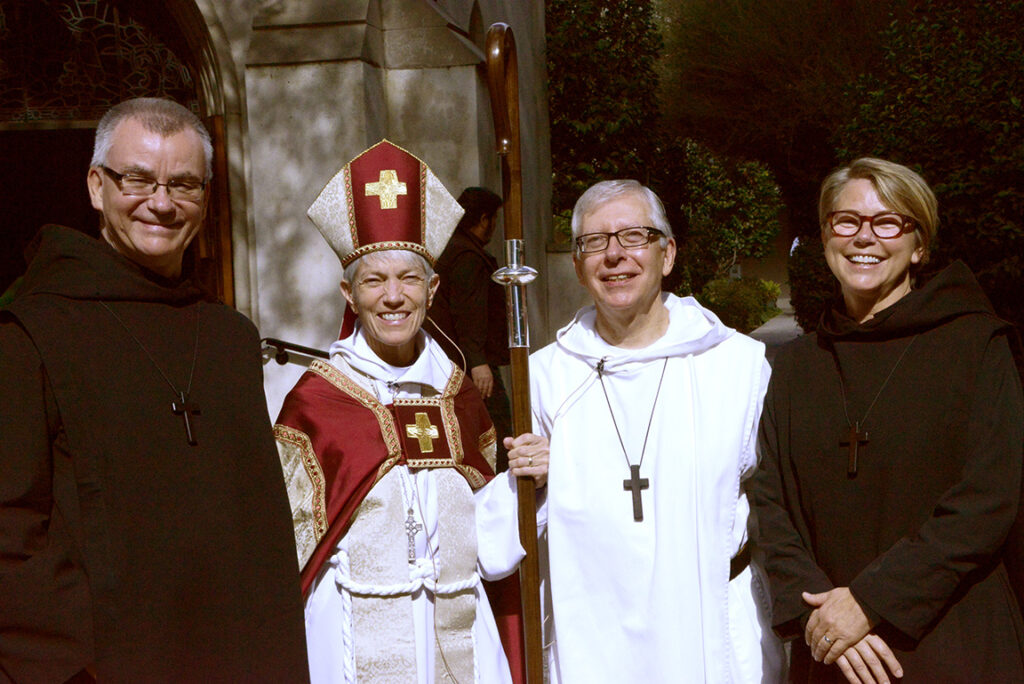
Dennis Gibbs (left) and Greta Ronningen (right) posed outside Church of Our Saviour, San Gabriel, on Nov. 1, 2014 after professing their life vows as founding members of the Community of Divine Love Then-Bishop Suffragan Mary Glasspool presided at the service; Brother Robert Sevensky, superior of the Order of the Holy Cross, received the candidates’ vows and preached. Photo: Chris Tumilty
Brother Carl Bowen, a divine companion, in written remarks read to the gathering, said that before he was introduced to CDL, “I had no family, no friends. I had been in prison for 13 years here in Florida. I never got any mail. I was at a point in my life where I wanted to give God my all and be part of a spiritual community. I had sent out 10 letters to different communities of God and only CDL wrote back. And they have welcomed me. I am happy to say that I have a family now. I feel blessed.”
Soledad Hernandez, incarcerated in Chowchilla since 2014, recalled meeting Gibbs and Ronnigen while housed at the Twin Towers in Los Angeles. Their presence helped her realize “we are never alone in the world,” she wrote in a testimonial read to attendees.
“They gave me hope so I wouldn’t give up on fighting my case. Brother Dennis has been someone that saved me from my own self-destruction. I was broken and ready to give up on the world,” according to her written remarks. “Brother Dennis is an amazing person who is caring and loving and inspirational to me as well as others he has met throughout his journey with us inmates. He is still part of my life and continues to bring peace and love to me and my family.
“Thanks to CDL I am currently working on myself and trying to figure out myself before I leave this place and come home to my family. They are my support system, and amazing servants of God, who will continue to change people’s lives one inmate at a time.”
Also present on the call was the Rt. Rev. Catherine Roskam, retired bishop suffragan of New York, who has served as an assisting bishop in the L.A. diocese and as bishop visitor to CDL. She thanked and blessed CDL for their ministries.
The gathering was recorded and will be available for viewing later. CDL continues to fundraise for its move. Donations may be made through the website or mailed to 617 W. Roses, San Gabriel, CA 91775.
